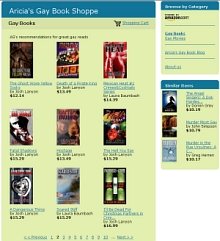Gay vampires: perverse immortality in Lost Souls
 Love it or loathe it, you can't seem to ignore this vampire novel -- and it depends who you talk to, whether it's garbage or gold. Poppy Z. Brite has a writing style that's hard to compare to anyone else. The only other writer I can think of with something like this style is Taylor Caldwell (specifically, Captains and The Kings; not so much her other works), and once again, what you get out of it is down to your "ear," which is a very personal quality. I've heard PZB's writing called "lyrical," and "incredibly visual." I've also heard the same style, the same wording, called "bloated and boring." So the only recommendation I can make about this novel is --
Love it or loathe it, you can't seem to ignore this vampire novel -- and it depends who you talk to, whether it's garbage or gold. Poppy Z. Brite has a writing style that's hard to compare to anyone else. The only other writer I can think of with something like this style is Taylor Caldwell (specifically, Captains and The Kings; not so much her other works), and once again, what you get out of it is down to your "ear," which is a very personal quality. I've heard PZB's writing called "lyrical," and "incredibly visual." I've also heard the same style, the same wording, called "bloated and boring." So the only recommendation I can make about this novel is --
75% of people either like or love it, and the top 10% think it's the most fantastic thing they ever read. However, at the other end of the scale are 10% of readers who think it's the most boring, immature load of twaddle that ever wasted printing paper! So, the bottom line has to be, make up your own mind about this one. I'll tell you what I think, and leave the rest to you!
From the first, I was impressed by Brite's knowledge of the region. It's all set in the south, in and around New Orleans, and the area is painted in technicolor phrases. I was blown away by the narrative detail depicting a real place. You feel like you've been there. The story starts with a prologue introducing three punk vampires. Nothing like Dracula, or Ann Rice, or Mel Keegan's Nocture, this. These vampires are out there, weird. It's all about booze and drugs and sex -- oh yes, and being immortal, and fathering a new generation of their kind.
Brite's vampires are contemporary descendants of an elder species that would have had to hide from the sun. These guys don't have to stay out of daylight; they merely cavort at night because they prefer to. They can also eat and drink like normal humans ... they just "suffer" a kind of bloodlust, a blood hunger. Are they true vampires? Possibly not, because necessity doesn't drive them to blood. They bite, and they suck, and they drink blood, because they like it and want to.
So you have a rather perverse bunch of characters to start with, and the plot thickens from there. It's a difficult plot to pin down; it does go somewhere, but it gets there by such a circuitous rout that some readers have just become bored. Others (and by far the majority) are fascinated by the skillful weaving of the place, the time, the psychotic characters, most of whom seem to have no grasp of right, wrong, mortality, rsponsibility or destiny!
I was one of the fascinated ones. The book is murky, it does seem to go in five directions before the threads start to draw together and you glimpse where it's going. You'll either be drawn into its bloodthirsty, perverse clutches, or ... you won't.
The story is about characters and relationships, rather than action. There's Nothing, who is half vampire, sired in the midst of a drunken orgy at Mardi Gras time, by Zilla ... and there's Zilla, who's drop-dead beautiful, bisexual, with confused and confusing gender identity. And Molochai and Twig, his two companions in eternity and night. And Christian, enigmatic, gentle, much more intelligent and refined than the rest. And ... so on.
The plot isn't about events, facts, places, incidents; it's about how people weave around each other, how relationships form and tear apart. It will either draw you in with fascination or it will bore you senseless by page 100 of its 359pp length. I was one of those who were caught on its hook, but I can more than understand the wails of complaint from the other side of the fence!
The book has several downsides. It is slow-paced. It is confusingly structured in places. The descriptive passages are lavish to the point of "one more syllable and this will be overdone." (But Brite always, to me, stops with that one syllable to spare.) The characters are weird and perverse. People are killing their mates; there is a foray into incest, plus domestic violence. And booze and drugs. And vampires.
But I would have to say, all of the above were Brite's intention. She never set out to write a linear, clean-cut storyline with the pellucid writing style of your Keegan, your Lanyon, you Charles Nelson. She fully intended to write a murky swamp of a narrative where sensuality is thick as mist, and "sin" is something you kind of wade in, up to the tops of your galoshes.
Did it work? Most people say "oh, yes." Some people disagree. Depends what you want from a book. The only other novel I know that has this formless ebb and flow quality ... where you can't pick the storyline to save your life, but fascination with the place, the time, the people, keeps you reading ... is Ann Rice's The Feast of All Souls.
The gay content is like a background buzz. It's just there. Brite makes nothing special of it, and there certainly isn't any specific relationship to focus on. The term I'd use is "omnisexual." (Yep, like Cap'n Jack himself.)
I have to recommend this book, because I've never forgotten it, and still relish the incredible richness of the prose, the sheer weirdness of the characters and the way Brite makes a plot come together somehow, from apparent plotlessness! But be warned: 10% of the folks reading this will more than likely hate the whole thing.
AG's rating: 3.5 or 4 out of 5 stars, depending on how I feel at the time. (Can't give it 5, because it's just so much of a challenge for so many readers).
Still in print, and readily available from Amazon. (You can buy some amazingly cheap copies, but consider doing the industry, and the author a favor: buy a new one!)









1 comments:
This is a treasure and I have to agree, it is one I've not forgotten. :)
I think out of all of hers though it was Drawing Blood that was my absolute favorite. A totally drug fueled mind bender of a book that stayed with me for ages. Less fond of her new stuff, but might give it another crack if I can find it in PB here.
Wicked post. :)
Post a Comment